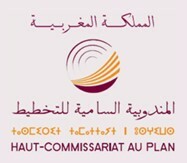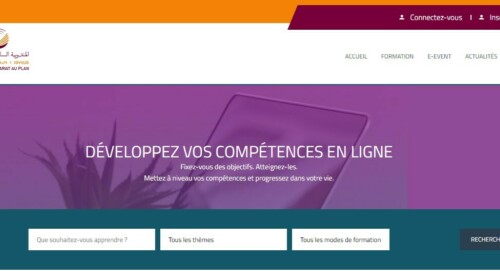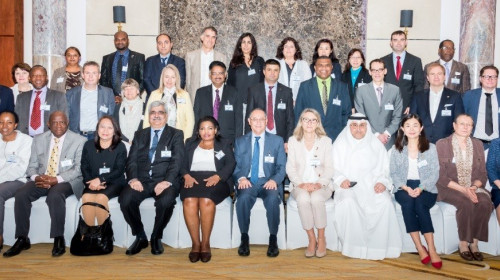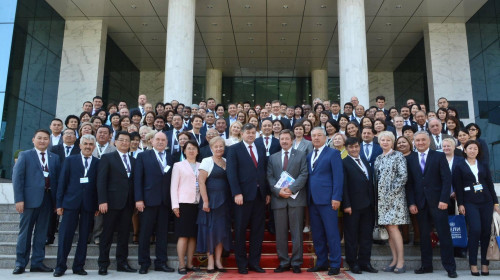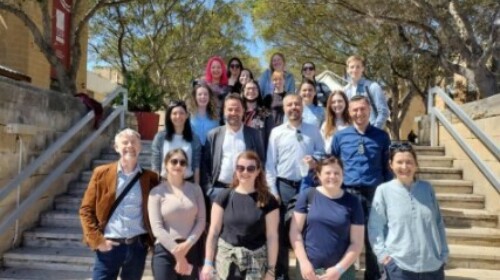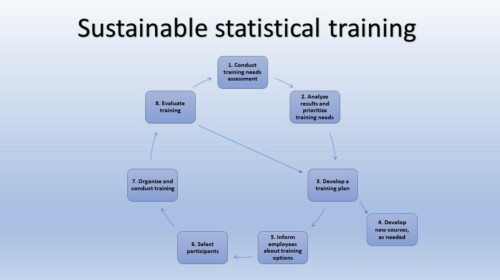The High Commission for Planning (HCP) is a public service organization founded in 2003, it’s the main producer of statistical, economic, demographic, and social information in Morocco. HCP is responsible for the preparation of quarterly and annual national accounts. The organization is also in charge of economic forecasts and prospective, socio-economic, and demographic studies.
The HCP attaches great importance to the continuous training of its staff to enhance their skills and improve their employability. In 2018, the HCP launched a new training strategy incorporating e-learning as a key component.
The HCP’s training strategy
We have developed our training strategy by adopting a methodical approach ranging from defining specific objectives, assessing employee needs, defining training content and programs, choosing training modes and methods, mobilizing human and financial resources, and finally post-training evaluation.
Objectives
Our aim is to optimize the effectiveness of learning and improvement programs, promote the development of skills, and achieve desired outcomes. We view the training strategy as a guide for all individuals involved in the training process, ensuring that they remain in sync with the overarching goals and priorities.
Needs assessment
To begin, we needed to properly determine the training requirements for the HCP’s staff. To achieve this, we gathered annual training needs from both central and regional entities. Additionally, we conducted a skills evaluation of over 250 managers and executives. We have also implemented a « Human Resource Planning » forward-looking jobs and skills management system for the next five years, focusing on anticipating future job demands and the skills required.
This approach has enabled us to determine the main areas of continuing training to be developed, which are:
- Statistics and data collection
- Planning and Sustainable Development Goals (SDGs)
- Economic modeling, forecasting, and foresight
- National Accounting
- IT and digital transformation tools
- Management
- Languages
Training modes and methods
To achieve our goal of satisfying all of our staff's training needs, we have adopted a new training strategy based on the following three approaches
- Face-to-face training
- Training as part of International Cooperation
- E-learning
Face-to-face training
We draw up an annual face-to-face training plan to meet our employees' learning needs and minimize gaps in the skills required to carry out their mission. Our training courses cater to a diverse group of professionals, including operatives, technicians, supervisors, and managers. These courses cover a wide range of topics such as statistics, economics, sustainable development, information systems, and management. We collaborate with both internal HCP trainers and external experts to ensure the best learning experience. These training courses are organized on a regional and central level, with small groups of up to 20 people per module.
Training as part of International Cooperation
The HCP’s staff participate in training workshops through international and regional partnerships, as well as bilateral projects with various organizations such as Medstat IV, Eurostat, INSEE, AFRISTAT, ESCAW, World Bank, BAD, ILO, AITRS, IMF, CEA, and others. The training courses have a specific focus on topics related to the implementation of new standards and methodologies like revised classifications, United Nations manuals, quality standards, and green economy, among others. Additionally, they cover the use of innovative statistical tools such as R Language, ERETES, and new technologies in production and dissemination processes including Big data and data visualization. The international cooperation training courses are tailored to meet the needs of country strategies and are adapted to the context of the recipients.
Through international cooperation, the training provided has evolved to become more diverse in terms of mode and coverage. This includes the adoption of online training, thematic coverage on topics such as SDGs and technology, and targeting executives from various regional departments such as gender, statistical processes, technological tools, and strategic planning. In 2022, a total of 95 managers were able to benefit from this international cooperation training.
HCP’s E-learning Strategy
Since 2018, HCP has been implementing a new e-learning strategy. HCP’s e-learning strategy has been launched as part of a digital transformation program for all of HCP’s business and management processes.
The first stage of this strategy was focused on introducing our staff to online training and certification. This was achieved by registering for MOOCs or training modules on various existing e-learning platforms. All HCP staff were provided with access to several MOOCs covering a range of topics, including statistics, economy, management, and information systems.
The second step involved developing our own e-learning platform, HCP Academy (https://www.academy.hcp.ma/), which gives employees access to a range of MOOCs and e-learning materials, according to their needs, to develop their knowledge, skills, and professional know-how.
We have organized our e-learning platform's online content into eight categories: Economics and Statistics, Living Standards and Income, Population and Demographics, Sustainable Development, Management, Digital Transformation, Languages, and Census.
The HCP Academy platform provides employees the opportunity to access training at any time, allowing them to learn at their own pace. It combines the flexibility and interaction of online learning with group dynamics, without worrying about logistical constraints. Initially, the platform was only available to HCP employees, but it will soon be open to national and international partners.
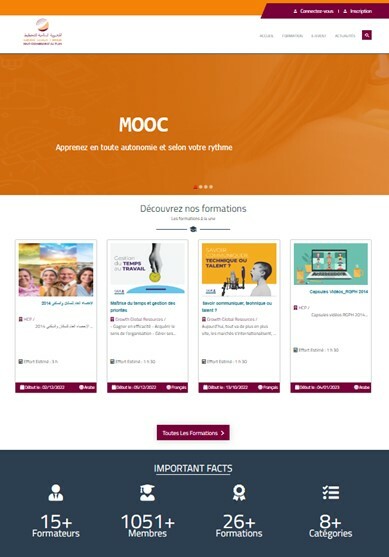
HCP Academy offers different training types:
- MOOCs
- Webinars
- Virtual Classes & Video Training
- Face-to-face training management
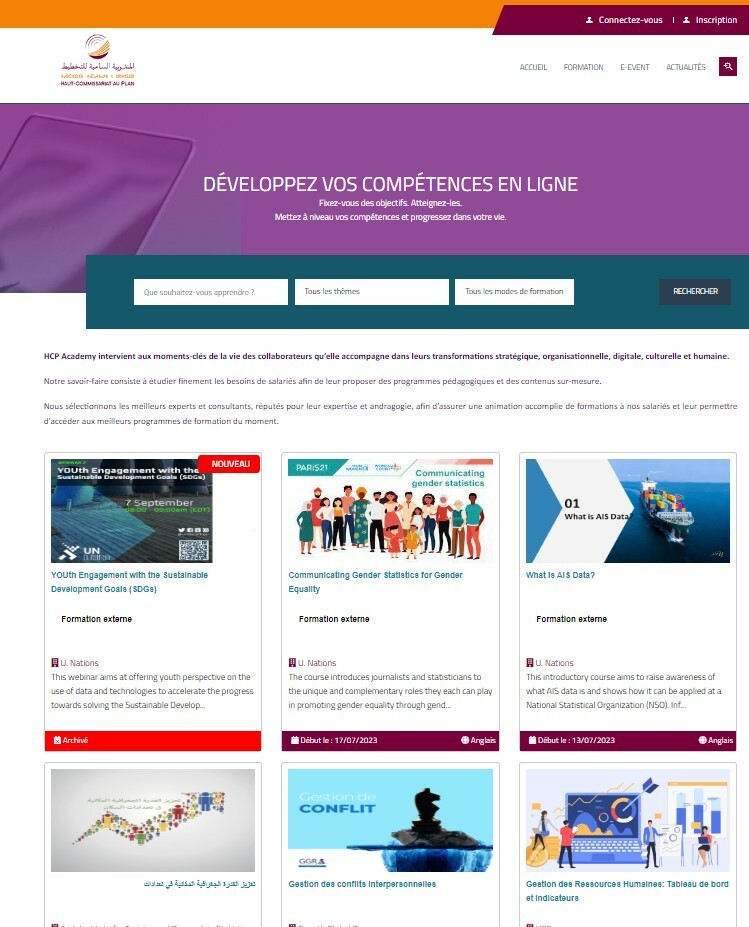
What the HCP Academy platform allows:
- Boosts involvement and responsibility to evolve and increase efficiency;
- Flexible learning method thanks to the ability to access the platform at any time;
- Accessibility: training available all the time;
- Modularization allowing the individualization of courses;
- Reduced training time thanks to more precise, better-targeted content;
- Responsiveness with updating training content according to the evolution of needs and technologies;
- Quality: research and posting of high-quality online training content.
Covid-19 impact on face-to-face training
The COVID-19 pandemic has brought about a radical change in the way we work and learn. With lockdowns and social distancing protocols, remote work became the standard for numerous employees. They have adjusted to the digital workspace, utilizing video conferencing software for virtual meetings and digital platforms for collaboration.
Due to the health emergency and containment measures implemented on March 20, 2020, HCP has decided to cancel all face-to-face training for the 2020 budget year. However, this has provided an opportunity to enhance our e-learning offerings. HCP employees now have access to a wide range of online training courses via various platforms such as FUN MOOCs, EDX, Coursera, MyMOOCs, etc. These courses cover a diverse range of topics including Leadership and Personal Development, Digital Transformation, Statistics, Data Analysis, Macroeconomics, Geographic Information Systems, IT, Informational Intelligence, Management, and Sustainable Development Goals (SDGs).
UN SDG - Sustainable Development Goals (SDGs)
The HCP provides training courses for its staff to enhance their understanding of the SDGs, and to gain insights into the ways in which the conceptual approach to these goals can promote innovation and transformation in data production and research for their programs. These courses also aim to help HCP staff comprehend the genesis and evolution of the concept of sustainable development and the SDGs, including their components, principles, values, and the modalities for monitoring and evaluating their implementation.
First, the face-to-face sessions were organized following the themes below:
- Global framework: Concepts, major areas, and principles of sustainable development
- Genesis and evolution of the concept of sustainable development
- New concepts and major areas of sustainable development
- Guiding principles of sustainable development
- Sustainable development implementation process
- Millennium Development Goal: Reminder, assessment and overall assessment
- Focus on MDG 7: ensure a favorable environment
- Sustainable development objectives: components and global orientations
- Institutional mechanisms for monitoring the implementation of the SDGs
- Agenda 2063 for sustainable development in Africa: the Africa we want to
- Genesis and evolution of the concept of SDGs
- Components, values, and principles of SDGs
- Practical group work: contextualization of the SDGs, convergence of strategies with the SDGs and targets, indicator metadata
Using UN SDG:Learn Platform
We have selected several MOOCs from the UN SDG:Learn Platform and integrated them into our HCP e-learning platform, "HCP Academy". This enables us to track the progress of each employee's online training and to provide personalized follow-up.
the main UNSDG: learn MOOCs followed by HCP executives are
- Introduction to Sustainable Development Goal indicators under FAO custodianship
- How to Achieve the Sustainable Development Goals
- Gender, Environment and Sustainable Development
- Inclusive Growth - Climate Change
- Compiling national metadata for Sustainable Development Goals
- Macroeconomics for a Sustainable Planet
- Understanding data and statistics better – for more effective SDG decision-making
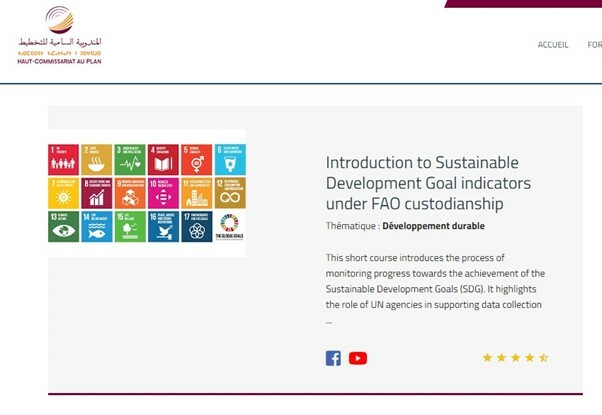
Conclusion and trends
Thanks to HCP's e-learning strategy, we have been able to enhance our employees' skills and offer them a wide range of training resources that were not possible to provide in a traditional classroom setting. Additionally, this e-learning strategy has allowed us to offer tailored learning experiences, instant feedback, and data-based knowledge, leading to ongoing improvements and optimization.
However, it's important to remember that the effectiveness of an e-learning strategy depends on a careful methodological approach, investment in both human resources and technology, ongoing evaluation, and adaptability. In a rapidly evolving digital landscape, it's essential to keep abreast of the latest developments and to incorporate feedback from learners and stakeholders.
Our organization is moving forward with the third phase of our e-learning strategy. We plan to develop MOOCs with the help of our skilled trainers and e-learning engineering partners. Our latest project aims to create MOOCs that cater to participants of the census scheduled for September 2024.
Finally, I can say that an e-learning strategy is a powerful tool for advancing education and training in the digital age. When thoughtfully designed and implemented, it has the potential to empower learners, stimulate organizational growth, and contribute to the success of individuals and institutions.
*Mr. Samir Issara is the Director of Human Resources and General Affairs at the Haut-Commissariat au Plan (HCP). He holds an Engineering degree in Digital Forecasting as well as a Master's degree in Business Administration.
During his tenure at HCP from 2013 to 2023, Samir worked on several skills development and training projects, including Human Resource Planning, skills assessment, career path system, and job mapping. He also played a key role in designing and implementing the "HCP Academy" e-learning platform and worked on several training plans.
In addition to his work at HCP, Samir is an active member of several institutions and councils such as the Board of Directors of the Arab Institute for Training and Research in Statistics (AITRS) and the Advisory Group of the GIST.
